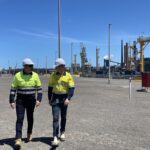The Spanish company will be instrumental in the German government’s plan to increase the country’s energy autonomy
Reganosa contributes to reinforcing the security of supply in Europe and consolidates its global leadership in the management of LNG plants owned by third parties
Reganosa will be instrumental in the German government’s plan to implement a fast and reliable alternative to Russian gas consumption. RWE, Germany’s second largest energy company, has chosen the Spanish multinational to set up and operate a new regasification terminal in Brünsbuttel, at the mouth of the Elbe River. This will consolidate the company’s global leadership in the management of LNG plants owned by third parties. Reganosa also contributes to strengthening the security of supply in Europe.
RWE is setting up a floating regasification unit (FSRU) in Brünsbuttel that will enable Germany to diversify its current energy supply basket by sea. Owned by the Höegh shipping company, this unit will have the capacity to store up to 170,000 cubic meters of LNG on board and to deliver 5 bcm (billions of cubic meters) of natural gas to the grid annually. Its commissioning has required retrofitting work on an existing jetty and the construction of a 3-kilometer branch line connecting to Germany’s high-pressure gas pipeline network. It is expected to be operational in the next few weeks.
As a result of an evaluation process of European operators, RWE has entrusted Reganosa with the supervision of the work prior to the commissioning of the facilities. It has also chosen Reganosa to operate and maintain the plant in the future.
The on-site deployment of company personnel began in the fourth quarter of 2022. In the phase prior to the commissioning of the terminal, among other tasks, Reganosa carried out technical consultancy work, preparing manuals, operating plans and procedures, supervising and guiding works, and preparing contracts, as well as advising on obtaining permits and authorizations.
Emilio Bruquetas, general manager of Reganosa, has emphasized that: “We are very proud to be able to contribute our knowledge and experience to this project, which requires us to be both agile and reliable. We are pleased to collaborate with RWE and the other partners in this challenge of increasing Germany’s energy autonomy. We are used to working in collaborative ecosystems; cooperation is key to providing Europe with security of supply, especially in the current turbulent scenario” he added.
This project underpins the Reganosa group’s international expansion process, initiated in 2015 with the incorporation of Reganosa Servicios to provide the group’s knowledge and experience in studies, project designs, consulting, engineering and asset management.
In recent years, the company has operated in 22 countries on four continents. With its intervention in those territories, it has covered all phases of project development, from the feasibility study to commercial operation.
As a result of this process of sustained growth and constant adaptation, Reganosa has nearly tripled its workforce in the last five years. The company has also consolidated its position as a world reference in the O&M of third-party energy infrastructures.
In addition to its own terminal in Mugardos (A Coruña), the group already manages or is set to manage three types of LNG terminals: totally afloat, those of Germany and Tema (Ghana); completely on land, that of Oristano (Italy); and mixed, that of Delimara (Malta). These facilities also have a wide range of storage capacity: from 9,000 to 300,000 cubic meters.
At the same time, Reganosa continues to diversify its business, committed to a new and sustainable decarbonized economy. It is currently developing projects and providing services in the fields of efficiency, digitalization, circularity, green hydrogen, renewable generation, and energy storage.



